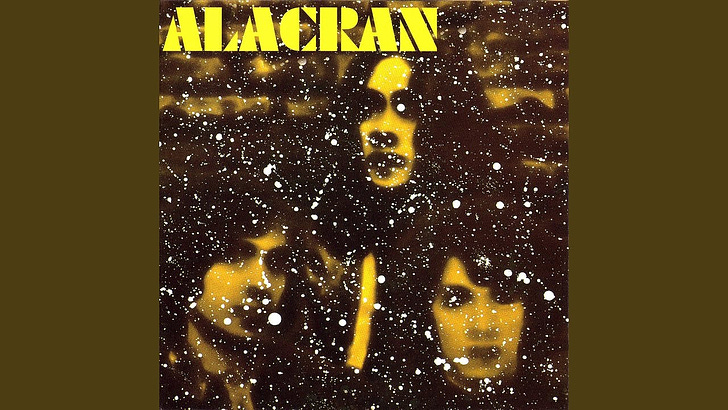There’s nothing particularly innovative about the self-titled debut of the Madrid trio Alacran. It was recorded in 1969 – the same year Santana’s galvanic debut arrived to deliver the gospel of Latin-rock – but not released until 1971, and then just in Spain and Brazil.
Alacran, the group’s only album, is built on common currency rock drum patterns (spiced by conga, cowbell and other percussion), and typical blues-based rhythm guitar patterns. The drummer and songwriter, Fernando Arbex, had been part of Los Brincos, the so-called “Spanish Beatles;” by the time he assembled Alacran, he knew how to cast a spell with simple musical devices.
Arbex’ songs for Alacran, which are sung in not terribly artful English by bassist Ignacio “Inaki” Egana, are mostly vamps. The lead track “Sticky” and another standout, the son montuno-inspired “Son (America, America),” cruise along in that now-familiar Santana jamming lane, with Arbex multi-tracking an unflappable, if businesslike, Latin percussion section. The feel suggests a psychedelic-rock sojurn of considerable length – these carefree tracks, which exhort listeners to “Do what you like, baby,” would work magic rattling from a transistor radio on a crowded beach on the Spanish coast.
It's easy to dismiss records like this on grounds of copycatism or bandwagon jumping. Knowing how Latin-rock unspooled from Santana through the adjacent group Malo and others, the temptation is to write off footnote-dwelling derivations like this with a brisk “life is too short” swipe away.
Not saying it’s an error to do that – we all need to prioritize.
But here’s what you would miss: The glinting, treble-forward, gorgeously knifelike lead guitar of Oscar Lasprilla. From the very first expression of the “Sticky” refrain, Lasprilla’s rejoinders detach the track from its formatting, bringing a kind of savage lunacy to the proceedings. His sound is its own energy field. His recurring (possibly written?) answering phrase is delivered with such crisp articulation – and brute force – it literally leaps from the center of the mix to burrow into your cranium. The brief guitar solo is notable for its open spaces, with Lasprilla tossing out unpredictable, contorted twists of phrase and then hanging back to let them sink in. “Son (America, America) contains an even longer, more intense solo; had this trio performed live (it apparently didn’t), this could have easily gone on for awhile.
Researching Alacran and Lasprilla specifically, I was surprised to learn more about his backstory – as part of the successful mid ‘60s Colombian garage-rock bands Los Ampex, Time Machine and The Speakers – than about anything he did after Alacran. That’s a shame, because Lasprilla, who also played piano and organ on Alacran, has a great sense of freedom in his playing, a distinct signature as an improvisor. I’m curious to hear any music he's created since.





